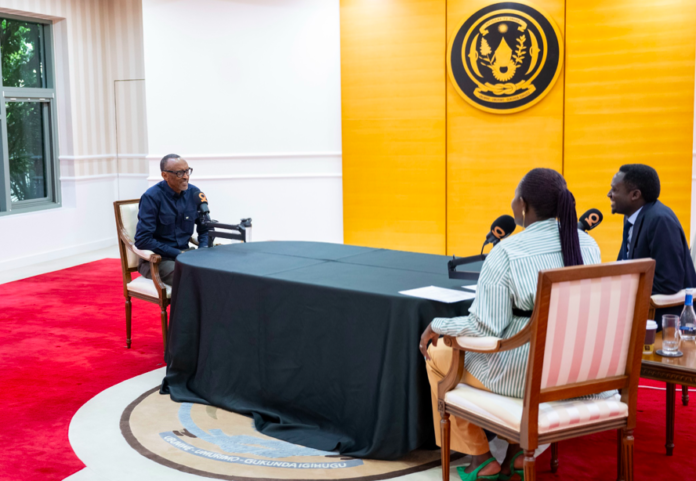In an interview with local media, Radio 10 and Royal FM on April 1, 2024, Rwandan President Paul Kagame provided a detailed justification for his continued leadership, amid growing inquiries about his reluctance to relinquish power. Kagame’s tenure, which officially began in 2000 following the resignation of Pasteur Bizimungu, has been a period of significant transformation for Rwanda. However, this era has also been marked by increasing scrutiny over the democratic process and political freedoms within the country.
Kagame argues that Rwanda’s unique developmental and societal challenges necessitate stable leadership, suggesting that his decision to remain in power is not driven by a personal affinity for authority but by a perceived duty to guide Rwanda towards the aspirations of its citizens. He emphasizes that his leadership is at the behest of the Rwandan people, who he claims have expressed their desire for him to continue. This perspective aligns with his acceptance to run for another term in the upcoming July elections, backed by the FPR Inkotanyi party.
However, this narrative is contrasted sharply by the experiences of those who have dared to challenge Kagame’s leadership. The Rwandan political landscape has seen a disturbing pattern of suppression and incarceration of potential political opponents. Notable figures such as former President Pasteur Bizimungu, Faustin Twagiramungu, Dr. Théoneste Niyitegeka, Victoire Ingabire, Bernard Ntaganda, Diane Rwigara, Gilbert Mwenedata, and Barafinda Sekikubo Fred, among others, have faced severe repercussions for their attempts to participate in the political process. These actions cast a shadow over the legitimacy of the electoral process and raise questions about the true nature of democracy in Rwanda.
Kagame’s comparison of Rwanda’s political situation with that of established democracies like the United States underscores his point that different nations require tailored governance approaches. However, his critics argue that this stance conveniently overlooks the essence of democratic governance, which is rooted in the periodic and peaceful transfer of power through free and fair elections.
Despite Kagame’s assertions that leadership should be measured by its impact on the populace rather than its duration, the prevailing view among observers is that the forthcoming elections in July 2024 are unlikely to herald significant political change. Predictions suggest Kagame will secure a dominant victory, continuing a trend that has seen little competition or opportunity for alternative leadership visions to emerge.






























































